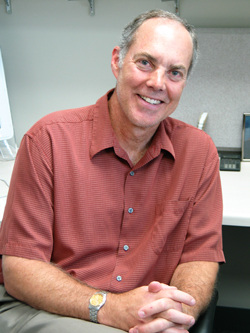
UNMC researcher Rob Lewis, Ph.D., answers questions about his work, life and interests.
NOTE: This profile is part of a series highlighting the 25 researchers who were named UNMC Distinguished Scientists for 2006. Each of these researchers will be profiled in UNMC Today leading up to a March 12 ceremony to recognize their achievements.
- Name: Rob Lewis, Ph.D.
- Title: Professor, Eppley Institute
- Joined UNMC: 1991
- Hometown: Downey, Calif.
Q: Describe your research in 25 words or less.
A: My laboratory studies intracellular mechanisms that regulate cell proliferation and metabolism. Our research is relevant to cancer, diabetes and obesity.
Q: How did you decide to pursue this area of research?
A: My interest in this area of research stems from my postdoctoral training, which was focused on insulin action. The research we are currently pursuing stems from experiments we performed in 1996.
Q: When did you realize you were interested in research?
A: I’ve been interested in the research since I was a sophomore in college, where I worked in a laboratory studying muscle biochemistry.
Q: What are the greatest challenges in research today?
A: Finding sufficient time and money to explore all the new questions that have arisen from the lab’s efforts.
Q: Best advice for new researchers?
A: For students:
Work in areas that capture your imagination. Life in science is short, time is precious. What you work on and with whom you work with will dictate your future in science for better or worse.
For the new assistant professor:
- Find an institution that will patiently nurture you and your nascent research program. The Eppley Institute served that role for me.
- The first person you hire will be the most important for your success. Choose wisely.
- Publish your results in solid journals.
- Focus your effort on your own bench work and then, as your lab grows, on your students and post-docs. If they do well, you will do well.
- Never let a lack of money get in the way of doing a good experiment. I credit my postdoctoral mentor, Mike Czech, for that sage advice.
Q: When an experiment stalls, what drives you to continue on?
A: Good questions demand good answers. If the experiment is a good idea and technically feasible, but gives us a result we don’t understand, that is often the best outcome, because it is likely to teach us something completely new and unexpected.
Q: Who has been your greatest teacher?
A: Can’t name just one. My eighth grade English teacher, Martin Townsend, Mike Czech, my postdoctoral mentor, and the people in my lab, past and present and have been my best teachers at the various stage of my life.
Q: Tell us about your family and hobbies outside the lab.
A: I’m married to Sally Lewis, I have two daughters, Katie, 16, and Natalie,14. For fun, I read and I play golf (far less than my colleagues would have you think).
Q: Globally, describe the most notable research achievement ever?
A: The germ theory of disease by Pasteur or any other achievement that was necessary for saving the most lives worldwide.
Q: What would you tell a student interested in a research career?
A: Early in your college career, test your interest by spending a summer working in a lab.